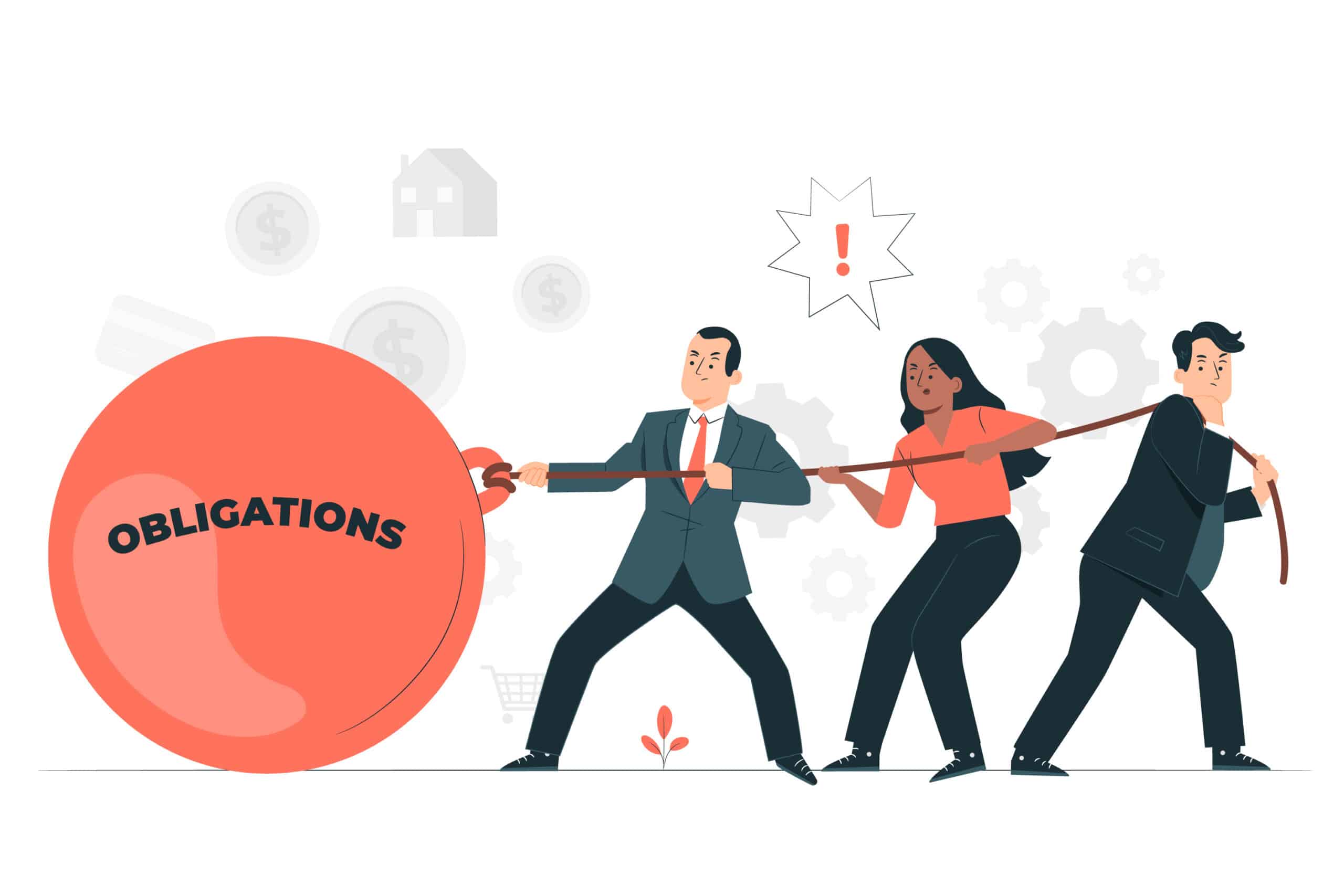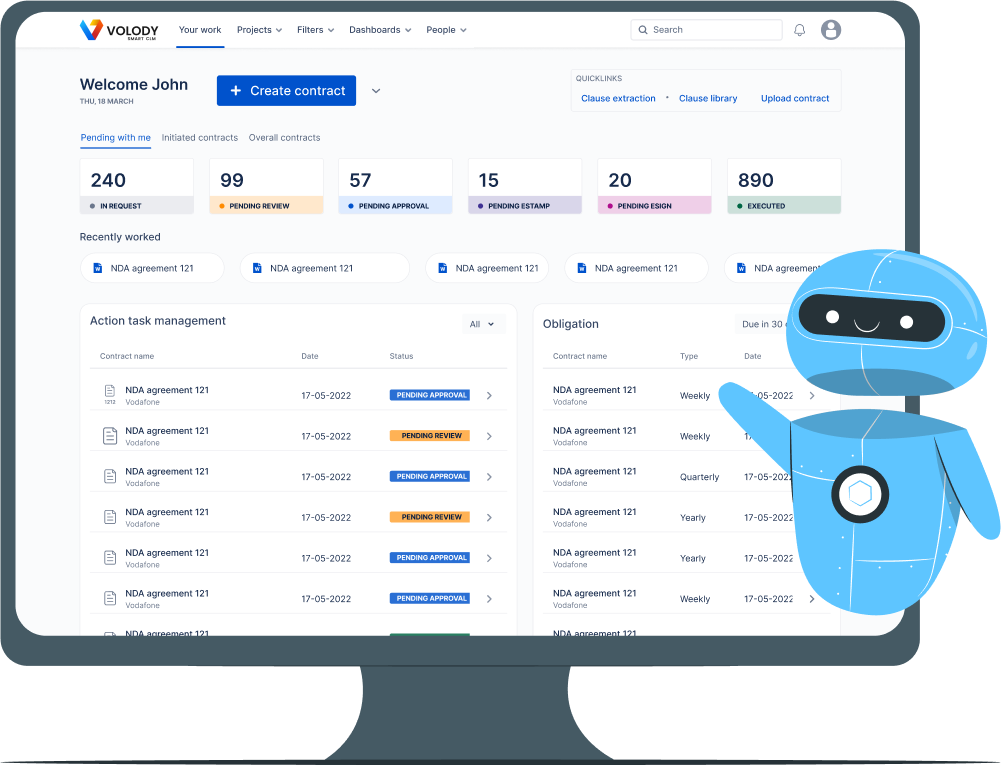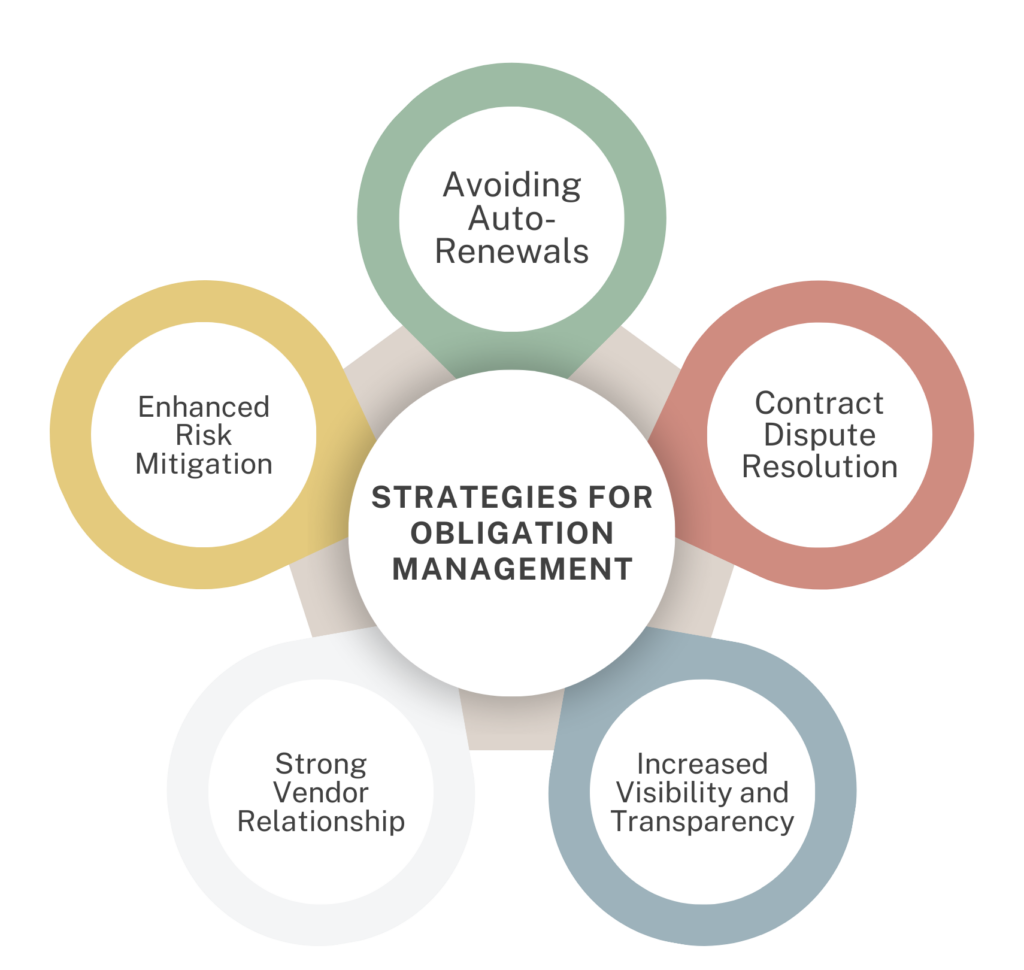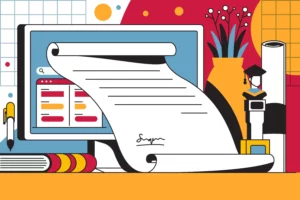Imagine navigating a busy highway where every exit and turn represents a contractual obligation. Missing one could mean delays, fines, or even reputational damage. That’s where contract obligation management comes in—it’s about keeping track of every promise made within a contract and ensuring both parties fulfill their duties on time.
It’s not just about meeting deadlines; it’s about proactively managing responsibilities, identifying risks, and maximizing opportunities for better outcomes. Effective contract obligation management helps businesses avoid costly mistakes, build stronger relationships, and ultimately drive long-term success.
This blog explores the key components of contract obligation management, including strategies for preventing auto-renewals, enhancing risk mitigation, ensuring discounts are claimed, and building strong vendor relationships. We’ll also highlight how contract lifecycle management software can streamline these processes for greater efficiency.
Understanding Contract Obligation Management

Contract obligation management means keeping an eye on and handling the promises made in a contract. This involves finding, watching, and finishing the tasks that both parties agree to. Good contract obligation management does more than just stick to deadlines. It requires being proactive so everyone knows their roles. This practice helps lower risks and enables us to grab chances for better value. This way is key to forming strong business relationships, preventing expensive errors, and achieving positive results for all parties involved.
Contract management changes from being something you do after issues arise to a key tool for reaching business goals. When companies include contract duties in daily tasks, they can make their processes faster. They can cut down on manual tasks and ensure that contracts are handled well, rather than just stored away.
Related Article: What are Contractual Obligations? Your Master Guide
Key Components of Effective Obligation Management
Effective management of contract obligations depends on several important parts that work together:
- Tracking and Monitoring: Use a simple way to keep track of all contracts, deadlines, milestones, and documents in one place.
- Alerts and Notifications: A system should send alerts and notifications for upcoming deadlines and possible issues. This helps manage tasks before they become problems.
- Defined Roles and Responsibilities: It is important to give each person their own tasks. Everyone should know their roles and what they are responsible for in the contracts.
- Performance Tracking and Reporting: You need a way to regularly check how well people are meeting contract requirements. Making reports helps to see progress and find problems early.
Businesses can use these parts to create a strong system. This will help them handle contract obligations well.
1. Avoiding Auto-Renewals Through Proactive Management

One important benefit of managing contracts well is that it helps stop unwanted auto-renewals. Many contracts have clauses for automatic renewal. These clauses keep the deal running for a specific time unless one party decides to end it. If businesses do not manage their contracts properly, these renewals can cause unexpected costs and put them in tough situations.
Businesses can watch when contracts end closely. This way, they can renegotiate or end the agreement at a good time. It helps them manage their contractual commitments and avoid extra costs.
Strategies to Monitor Contract End Dates
- It’s important to know when contracts finish.
- Here are some simple ways to handle this:
- Automated Notifications: Automatically send emails or alerts to remind the right people about contract end dates.
- Centralized Contract Repository: Create a central place to store contracts. This helps you track important dates and receive automatic reports on upcoming renewals.
- Regular Contract Reviews: Schedule a regular time to review contracts. This lets you check how things are going, spot upcoming renewals, and manage obligations early.
By tracking when contracts end and preparing for renewals, businesses can prevent surprises. They can also negotiate better terms or find other options that suit them.
Benefits of Preventing Unwanted Renewals
- It helps you save money.
- You have better control over your budget.
- You can avoid paying for services you do not use.
- It lowers your stress about surprise bills.
- You get to choose which subscriptions to keep.
- Cost Savings: Businesses can save money by canceling automatic renewals of contracts they do not need or find useful.
- Negotiating Leverage: When businesses know about renewals early, they can bargain for better terms and lower prices with vendors.
- Mitigating Financial Risks: Unwanted renewals can lead to financial problems. This can happen if the contract terms are no longer favorable or if the business needs have changed.
By taking care of renewals early, businesses can improve their contract terms. This practice lowers financial risks. It also makes sure they get the best value from their agreements.
Related Article: What is an Automatic Contract Renewal Clause? Detailed Guide
2. Enhanced Risk Mitigation

Effective contract obligation management is key to reducing risks. When businesses track their obligations regularly, they can see where they may not follow rules or may breach the contract. This practice helps organizations solve issues quickly. By doing this, they can reduce possible legal consequences and safeguard their interests.
When companies include risk management in their contract process, they encourage the practice of obeying rules. This can lower the chances of legal problems. It also helps them gain the trust of their stakeholders.
Identifying potential risky clauses and liabilities in contracts
To manage risks well, it’s important to identify possible problems in contracts as soon as you can. You need to understand the contract terms, the laws that apply, and any situations that might cause conflicts. Here are some key steps:
- Careful Contract Review: Always read contracts closely when you write or discuss them. This helps you identify and correct any risks or issues.
- Risk Assessment: Continually look for risks related to contracts. Stay aware of news in your industry, any new rules, and changes in how the business works.
- Scenario Planning: Create backup plans for possible problems that might cause issues with contracts.
- Finding risks in contracts early helps businesses.
- They can act to fix problems.
- This safeguards their interests.
Minimizing financial and reputational risks for the company
Effective contract obligation management is important for lowering financial and reputation risks for a company. When businesses meet their obligations on time, they can prevent:
- Financial Penalties: If you break a contract, it can result in costly fines, legal fees, and damage to business relationships.
- Reputational Damage: Ignoring contract rules can seriously harm a company’s reputation. It can make stakeholders lose trust and lead to missed business opportunities.
Consider these mitigation strategies:
|
Risk |
Mitigation Strategy |
|
Late Payment |
Implement automated payment reminders & establish clear escalation paths for overdue invoices. |
|
Missed Delivery |
Set realistic deadlines, communicate proactively with suppliers, & have backup options in place. |
|
Data Breaches |
Ensure contracts include strong data protection clauses & conduct regular security audits. |
Related Article: Legal Risk Management: A Comprehensive Guide for Businesses
3. Creating a System for Contract Breaches and Dispute Resolution

Even when everything is handled properly, contract disputes can still come up. A plan to deal with these problems fast can save time, money, and stress.
The key is to create a simple process that everyone understands. This process should clearly explain what to do when a problem arises, like a missed deadline, a misunderstanding, or something else. The goal is to address small issues before they become big ones.
One way to do this is by adding certain clauses in your contracts about how to manage disputes. This might include things like mediation or negotiation, where both sides work together to find a solution. It’s also good to choose someone, or even a team, to handle disputes when they come up.
Contract management software can really make a difference. A good system lets you track all communication and actions taken during a dispute. This clear view helps you understand what happened, what has been done, and how to proceed. It keeps things fair and organized, so you won’t feel rushed when problems arise.
Having a clear way to handle disputes can help businesses stop small issues from turning into big problems. It’s important to stay proactive and protect your business relationships.
Related Article: Contract Disputes: A Comprehensive Guide
4. Building Strong Vendor Relationship

Effective contract obligation management is about more than just following rules. It also focuses on building good relationships with vendors. When both sides take care of their promises and fix problems quickly, it creates trust. This trust helps them work better together.
Seeing contract obligation management as a team effort helps businesses create a strong sense of respect and understanding. This can lead to longer-lasting and better partnerships.
Establishing clear expectations and objectives in contract agreements
A key part of building strong relationships with vendors is to set clear goals and expectations from the start. This means:
- Clearly Defined Scope of Work: Explain the work in simple terms. List exact tasks, due dates, and what is expected for good performance.
- Communication Protocols: Set up clear ways to talk and share information. This helps both sides connect quickly and effectively.
- Performance Metrics and Reporting: Find important key performance indicators (KPIs) and know what reports you need. This helps with tracking progress and fixing any issues.
Regular communication and updates on contract progress and performance
Open and regular communication is important for keeping strong relationships with vendors.
- Regular Check-Ins: Set up regular meetings or calls to talk about how the contract is doing. This will help you address any worries and keep the conversation going.
- Performance Feedback: Give vendors feedback about their work. It’s good to recognize their successes and discuss how they can improve.
- Transparency and Collaboration: Share important information openly. Include vendors in talks about any contract updates or issues that come up.
By keeping communication simple, solving problems quickly, and working together, businesses can build better and stronger connections with their vendors.
Related Article: Contract Management for Procurement: Elevate Your Strategy
5. Increased Visibility and Transparency

In the past, people kept contracts in filing cabinets. This made it hard to know what an organization had agreed to. Now, with good tracking technology and better obligation management, businesses can clearly see their contracts and obligations.
This visibility helps people choose better. It makes it easier to stick to the rules. It also helps to manage contracts more wisely.
A clear understanding of contract terms and obligations
Increased visibility helps everyone understand the contract terms and what they need to do.
- Easy Contract Repository: A central repository that helps you access contract documents, updates, and related materials easily.
- Searchable Databases: You can use searchable databases to find specific clauses, terms, or obligations in many contracts quickly.
- Data Visualization Tools: Use tools that make contract information clear. They help you understand data like deadlines, spending habits, and performance trends.
Real-time tracking of performance and compliance
Real-time tracking helps us see how contracts are working. It checks if people are following the rules. This is important for managing responsibilities. We want to catch any issues before they happen.
- Automated Compliance Monitoring: Use automation to keep an eye on important contract rules. This can involve delivery times, service quality, and legal needs.
- Performance Dashboards: Use dashboards to view legal KPIs. They help you track contract fulfillment and can point out problems.
- Audit Trails: Keep detailed records of changes to contracts, communications, and actions. This shows that you are responsible and clear about your methods.
Businesses can use real-time tracking. This allows them to move from reacting to problems after they happen. Instead, they can manage contracts more actively.
Related Article: What is a Contract Repository? Effective contract storage
How Volody CLM Helps in Managing Obligations

Volody’s contract management software makes it easier to handle contract obligations. It uses the power of generative AI to automate many tasks that take a lot of time. This cuts down on manual work and lets businesses focus on their main goals. It helps track obligations on time and ensures that companies follow the rules for different types of contracts, from NDAs to commercial agreements.
Here is how Volody can help you take care of your obligations:
- Obligation Tracking: Volody gives a clear view of all agreements. This makes it simple to track goals, rights, due dates, and contract terminations.
- Automatic Alerts: Automatic reminders help you not miss important dates or goals and meet all your regulatory compliance in a timely manner. This stops contract issues like breach of contract or not being able to manage obligations post-termination of the contract.
- Clarity with Complex Contracts: Volody makes complex contract language simple to read. This helps you understand each person’s duties and avoid mistakes.
- Integration with Other Systems: It works well with ERP, CRM, and other tools. This gives you a clear plan to manage duties in your business processes.
- AI-powered Risk Analysis: If you are planning to end a contract or facing a legal issue, Volody helps lower risks. It gives real-time tracking of duties and helps you make good decisions.
With Volody, businesses can make sure they fulfill all their duties. They can also get maximum value from their contracts and lower risks.
Conclusion
In conclusion, it is very important for businesses to manage their contract obligations well. By tracking contract end dates, spotting risks, claiming discounts, and building strong vendor relationships, companies can improve their operations and reduce risks. This helps them follow rules and boost their finances and partnerships.
Using smart contract management practices lets businesses handle contract details more confidently and efficiently. This can lead to long-term success and growth. If you want to improve your contract management strategies, using these key points can change how you manage obligations and relationships in your business.
Related Article: Top 10 Contract Management Software: Best CLM Tools in 2024
Frequently Asked Questions
What is the importance of proactive contract management?
Proactive contract management is crucial. It involves carefully tracking duties and making sure they are done on time. This practice lowers risks and ensures that rules are followed. With effective contract management, businesses can avoid problems and take advantage of new chances.
What strategies help in avoiding auto-renewal of contracts?
It is important to set alerts for when contracts end. You can use contract management software to help keep track of these dates. This software lets you set up automated reminders. Make sure to read the contract clauses about auto-renewal and termination carefully.
How does obligation management support compliance efforts?
Contractual obligation management helps follow rules and requirements. It allows legal teams and important people to keep track of deadlines, tasks, and performance. This way, they can make sure everyone meets their obligations on time.
How do alerts prevent missed obligations?
Automated alerts notify teams ahead of time, ensuring they have enough time to take action and avoid any penalties or missed opportunities.





